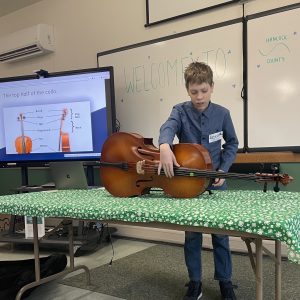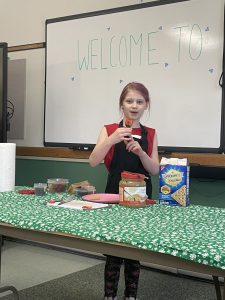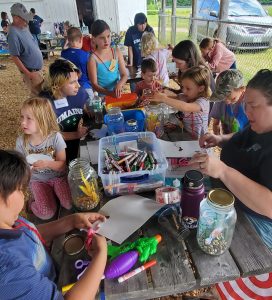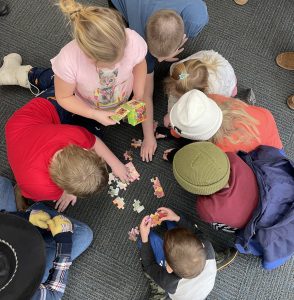2023 Annual Report
University of Maine Cooperative Extension Hancock County – 2023 Annual Report
Our Annual Report features highlights of educational programming at the University of Maine Cooperative Extension in Hancock County June 30, 2023 – July 1, 2024
Table of Contents
- Office of the Dean
- Extension Association and Staff
- Digital Presence
- County Highlights – 4-H Positive Youth Development
- County Highlights – Maine Food Systems and Food Security
- State Wide Highlights
Putting university research to work in homes, businesses, farms, and communities for over 100 years.
Office of the Dean
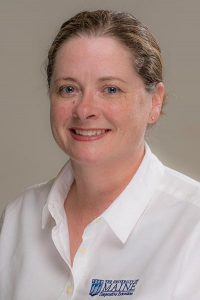
Welcome to the University of Maine Cooperative Extension! We are located in every corner of the state in 16 county offices, research farms, 4-H camps and learning centers, and online. We are the largest outreach component of the University of Maine and reach more Maine people than any other entity within the seven campus University of Maine System. Our work is focused on helping Maine communities thrive and we do so by connecting people to research-based information, education and services. UMaine Cooperative Extension conducts the state’s most successful out-of-school youth education program through 4-H, empowering young people to reach their full potential. Our youth programming also includes our 4-H camps and learning centers which provide opportunities for youth to engage in outdoor experiential learning. Extension also helps support, sustain, and grow the food-based economy across the entire state of Maine. In addition, we provide valuable statewide programming in nutrition education, healthy families and communities. We also partner with other organizations and programs to provide additional educational opportunities to a diversity of audiences across this state.
Extension faculty and staff across the state have also contributed to significant digital outreach this past year. Our Extension website (extension.umaine.edu), which is a combination of 60 interconnected websites, received 3.3 million views in 2023. We have over 700 research-based publications that are available as free downloads at extension.umaine.edu/publications. And in this past year, we had more than 3,200 customers register for workshops, events, webinars and more through our online registration system.
UMaine Cooperative Extension is determined to make a positive difference in our areas of excellence and beyond for the citizens of Maine. Explore our website, visit a county office, and contact our enthusiastic workforce.
— Hannah Carter, Dean
HANCOCK County Extension Association
President- Jeff Milliken – E. Blue Hill
V.President- Greg Veilleux – Bar Harbor
Treasurer- Mary Jude – Lamoine
Secretary- Kristin Beauchamp – Dedham
Members:
Dotty Caldwell Penobscot
Jane Freeman Ellsworth
Thania Hernandez Ellsworth
Melissa Malmstedt Sullivan
Betty Robshaw Bucksport
Mary Soper E. Orland
Hancock County Staff
Carla Scocchi, 4-H Youth Development Professional
Email: carla.scocchi@maine.edu
Leah McCluskey, 4-H Community Education Assistant
Email: leah.mccluskey@maine.edu
Tess Hureau, 4-H Aquaculture Community Education Assistant (recent hire)
Email: tess.hureau@maine.edu
Rachel White, Assistant Extension Professor, Sustainable Agriculture & Livestock Educator
Hancock & Washington Counties
Email: rachel@maine.edu
Suzanne Baez, Administrative Support Supervisor
Email: sue.baez@maine.edu
Andrea Mahoney, Administrative Specialist
Email: andrea.mahoney@maine.edu
University of Maine Cooperative Extension’s 2023 Digital Presence
Website
University of Maine Cooperative Extension’s website at extension.umaine.edu – a combination of over 60 interconnected websites consisting of nearly 12,000 published pages – received over 3.3 million pageviews from visitors in the 12 months between January 1, 2023, and December 31, 2023. Visitors searched for and found information on a wide variety of topics, including plant propagation in Maine, small business management, growing highbush cranberries, Tussock moth caterpillars, and how to tap maple trees and make maple syrup. A wide variety of interactive web forms allowed users to request assistance, presentations, newsletters, and updates; report volunteer hours; make donations; and respond to surveys. Nearly 55,500 web visits were referred from social media.
Social Media
More than 57,556 followers followed or subscribed to UMaine Extension’s 61 county and program-specific social media accounts on Facebook, Twitter, YouTube, Pinterest, Instagram, and TikTok. We hosted or co-hosted 118 Facebook Events that reached 243,248 users. Nearly 750 educational videos were available to visitors on our 14 YouTube playlists; many were also embedded in our web pages. Extension’s YouTube videos were the most watched on the University of Maine Channel, which received nearly 1.15 million views and 47,000+ hours of watch time. Top videos included Tick Removal, How to Prune a Blueberry Bush, Lobster Cooking and Eating, How Do I Prune Raspberries, and How to Prune a Lilac Bush.
Publications
More than 700 research-based publications on a broad range of topics were available for free download at extension.umaine.edu/publications. Popular fact sheets, such as Best Ways to Wash Fruits and Vegetables, Storage Conditions: Fruits and Vegetables, Facts on Fiddleheads, Guide to First-Time Horse Ownership, Maple Syrup Quality Control Manual, Growing Highbush Blueberries, and Recipe to Market: How to Start a Specialty Food Business in Maine received tens of thousands of pageviews each.
New publications in 2023 included How to Test Your Own Wild Blueberry Soil pH, Getting Geared Up for Maple Sugaring: Supplies and Equipment Needed for 1 to 50 Taps, Getting Geared Up for Maple Sugaring: Supplies and Equipment Needed for 50 to 500 Taps, Management of Volunteer Potatoes in Maine, Irrigation Resources for Maine Farmers, along with several new publications about forage grasses and legumes (Kentucky Bluegrass, Timothy Grass, Orchard grass, Smooth Bromegrass, Reed Canary Grass, and Tall Fescue) that will be combined to create the Maine Forage Handbook.
Online Registration, CDMS, Salesforce, Brightspace, and MailChimp
Nearly 2,478 customers registered for workshops, events, webinars, and more through our online Centralized Database Management System (CDMS) registration system.
724 customers registered for in person, on demand and virtual events through our online Salesforce registration system.
620 participants took Extension courses online via Brightspace. Classes included Master Gardener Volunteer training, Maine Gardener Training, Growing Hemp 2023, Boots-2-Bushels, FDA Food Sanitation, Maine Horticulture Apprenticeship, Growing Small Fruit on Your Farm, Business Planning for Producers, AQUEous in Indigenous Aquaculture, Soil Science for Gardeners, Extension Reporting System Training, EFNEP Orientation, Introductory Volunteer Management, Pollinator-Friendly Gardening, and Extension Civil Rights Training.
More than 12,494 subscribers received over 77,000 e-notifications via MailChimp.
HANCOCK County Highlights—
4-H Positive Youth Development
4-H is the positive youth development program of the University of Maine Cooperative Extension. Hancock County 4-H is focused on educating and empowering youth through hands-on and community-based experiences, with self-directed learning and collaborations. 4-H youth acquire knowledge and skills that will contribute to leadership and the ability to succeed now and in the future. The four “H’s” stand for Head, Heart, Hands, Health, and represent the foundation for positive youth development found in all 4-H programs. The 4-H model for Positive Youth Development is successful because of its focus on positive and sustained relationships between youth and adults, activities that build important life skills, and opportunities for youth to use these skills as participants and leaders in valued community activities.

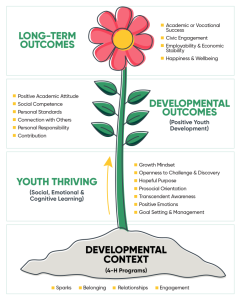 This picture illustrates the process of positive youth development in 4-H programs by showing the connection between high-quality program settings and the promotion of youth thriving.
This picture illustrates the process of positive youth development in 4-H programs by showing the connection between high-quality program settings and the promotion of youth thriving.
SELECTED PROGRAM HIGHLIGHTS
Building 21st Century Skills
4-H Public Speaking Program: UMaine Cooperative Extension 4-H has a robust Public Speaking Program for youth ages 5–18. Youth who participate in public speaking learn to evaluate basic public speaking skills, give and receive constructive feedback, and build confidence to express themselves in various life situations. For those who like the competition of the public speaking tournaments, youth choose a topic that they feel is important to share, practice it with family and/or with their clubs, and enter the Hancock County Public Speaking tournament. Youth who qualify have the opportunity to compete at the state level as well!
Public speaking is an important part of the 4-H experience, even for those who do not pursue formal public speaking opportunities. Many 4-H alumni report how important it was to have public speaking skills when they applied to college, interviewed for jobs, or when interacting with adult peers.
- Robert R. enlightens the audience about “Parts of a Cello” during the Hancock County 4-H Public Speaking Tournament, March 2024
- Bella G. shines as she carefully demonstrates “How to Make Graham Cracker Animals” during the Hancock County 4-H Public Speaking Tournament, March 2024.
Science, Technology, Engineering, and Math (STEM) Opportunities for Youth

4-H Aquaculture: 4-H aquaculture programs have expanded significantly this year under the leadership and direction of Hancock County 4-H Staff. The Maine 4-H Aquaculture Education Team includes partners such as the UMaine Center for Cooperative Aquaculture Research, Aquaculture Research Institute, Maine Sea Grant, Maine Aquaculture Innovation Center, and more. They are empowering young people with the skills and knowledge needed to thrive in a rapidly changing world, through the lens of aquaculture workforce development and sustainable food systems. By cultivating a generation of environmentally conscious, scientifically literate individuals, 4-H ensures that youth are not just consumers of knowledge but active contributors to sustainable and resilient communities.
4-H Tick Project: is a community science project that provides youth an opportunity to explore ticks and tick-borne diseases, which is a connected story of climate, ecosystem change, and public health. Educators conduct tick drags with youth participants to collect tick specimens in their local area. Specimens are returned to Hancock County 4-H, and then submitted to the UMaine Diagnostic Research Laboratory Tick Lab for identification and disease testing, which contributes to the lab’s Tick Surveillance program. Youth data also contribute to a community science (aka “citizen science”) project called the Maine Forest Tick Survey, which is a multiyear, multidisciplinary research project established to determine how forest land management practices impact tick populations and disease risk across Maine.
This project has garnered recent media attention:
- We Don’t Want Them to Be Afraid (News Center Maine)
- That Kid Found a Tick! (Penobscot Bay Press)
- Students Capture, Identify, and Study Ticks in Maine (News Center Maine)
- 4-H Collaboration Uses Ticks to Teach Kids About Ecosystems and Public Health (Morning Ag Clips)
- Kids in Maine are Learning Skills to Identify Ticks and Tickborne Diseases (News Center Maine)

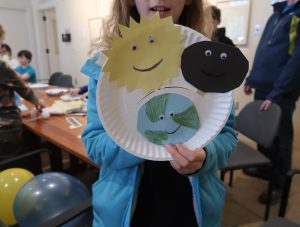
Total Solar Eclipse 2024: Hancock County 4-H, with support from NASA, educated youth and families in anticipation of Maine’s Total Solar Eclipse in April 2024. 4-H Staff championed engagement with this once-in-a-lifetime event by highlighting both the unique science and the wonder of solar eclipses. Learning experiences were focused on the time before and after the eclipse, leaving the day of the event open for sheer enjoyment.
Hands-on Virtual Learning
UMaine Cooperative Extension 4-H provides a variety of virtual learning opportunities throughout the year through the Maine 4-H Virtual Learning Hub. Established during the pandemic years, virtual learning has quickly become one of our most popular offerings. Workshop topics range from engineering, art, science, animals & agriculture, food & nutrition, teen leadership, and more. This program is powered by 4-H staff and volunteers. Delivered in Summers from 2020-2023 to over 600 youth; 84% of youth reported feeling connected to others, 94% were able to explore something they really cared about, and 100% felt welcome in the program.
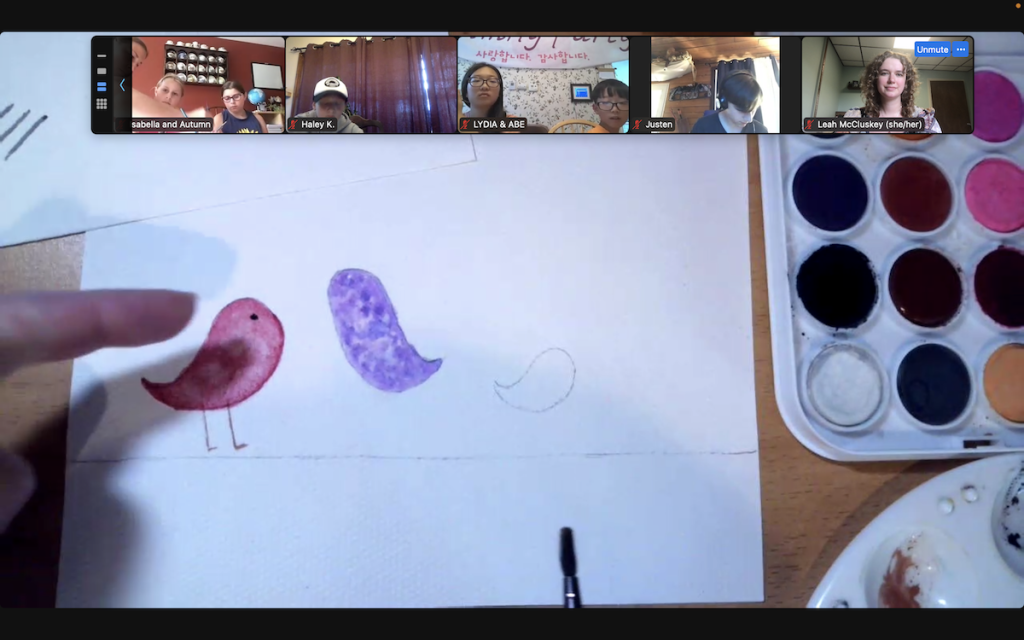
County 4-H Clubs, Programs & Events
Hancock County 4-H offers regular programs, clubs, and events for members of the Hancock County 4-H community. These include traditional 4-H clubs such as “Jolly Juniors 4-H Club” in Eastbrook & Waltham, “Horse of Course 4-H Club” in Deer Isle, and “Lock, Stock, and Barrel 4-H Shooting Sports Club” in Blue Hill; annual events such as 4-H Public Speaking, 4-H Style Revue, 4-H June Jamboree, 4-H @ the Blue Hill Fair, and 4-H Cloverfest; and programs such as afterschool programming at the Ellsworth Public Library and others.

- 4-H youth participating in a hands-on workshop at the annual 4-H June Jamboree hosted on the Blue Hill Fairgrounds, June 2024
- Escape the library!!
Selected Partnerships & Collaborations
- Ellsworth Public Library, Ellsworth
- UMaine Center for Cooperative Aquaculture Research, Franklin
- Lone Spruce Farm, Dedham
- Blue Hill Heritage Trust, Blue Hill
- Blue Hill Public Library, Blue Hill
- Pemetic Elementary School, Southwest Harbor
- Cave Hill Elementary School, Eastbrook
- Bucksport Middle School, Bucksport
Parent and Youth Testimonials
“The variety of hands-on activities that the children had to choose from allowed for each of my boys to find something that truly interested them as well as opportunities to try things they had never done before.” – Parent
“I love the positivity and the relaxing atmosphere of 4-H” – Youth
“Watching our children learn new things and engage other children with kindness is what I like best about 4-H” – Parent
“For me, 4-H is its own connected community, and that community is welcoming to all participants. Whether you’re a parent, a young 4-Her, or a volunteer, you have a place in 4-H” – Youth
HANCOCK County Highlights—
Livestock / Sustainable Agriculture / Home Horticulture
Hancock County specific
- Maine Food System
- Sustainable Agriculture and Livestock: From September 2023 to May 2024, Extension

Rachel White, Assistant Professor of Sustainable Agriculture and Livestock, meets a new calf at Tide Mill Farm sustainable agriculture experts assisted ten people with technical assistance through on-farm visits and discussions. Most discussions are with new farmers who are building their farms or are looking for animal care best practices.
- In June 2024, Hancock County Extension was represented at Equine Extravaganza at the Bagaduce River Equine Rescue, where over 100 people from across the county and state learned about equine health best practices.
- Sustainable Agriculture and Livestock: From September 2023 to May 2024, Extension
Statewide livestock programs offered
-
-
- Maine Sheep and Goat School- workshop
- Sheep Shearing School- workshop- In May, our new UMaine Extension Sustainable Agriculture and Livestock Educator, Rachel White, offered a 2-day Sheep Sheering workshop. More than a dozen people participated in this hands-on workshop.

- Small Ruminant Roundtable- discussion/ community networking group – The Maine Small Ruminant Roundtable is a new community-driven group, where informed discussions on animal management practices, challenges, and needs are selected by you, and facilitated by UMaine Extension and experts in the field. Whether you work with wool, meat, or dairy animals, there is something for everyone here! Participants can register to be notified about recurring Roundtable events, meetings, Zoom links, and community networking opportunities.
- Virtual Summer Equine Speaker Series (June- August 2024) – University of Maine Cooperative Extension is offering a new free Equine Speaker series to share new research, novel management practices, and solutions to common challenges with our equine companions. The theme for summer 2024 is “Pasture and System Management for Healthier Horses.”
-
Maine Food System
Hancock County Master Gardener Volunteers
During the summer, our Master Gardener Volunteers conducted community projects such as growing and gleaning food for hunger relief, youth gardening initiatives, and creating public native landscape plantings. In 2023, 129 Hancock County Master Gardeners strengthened our communities through their volunteer efforts. Collectively, Hancock County MGVs contributed 4,840 hours of labor valued at $144,958 in 2023. (Calculated using $29.95 per hour, source: Independentsector.org). Master Gardener Volunteer community projects are located in Bar Harbor, Blue Hill, Brooklin, Eastbrook, Ellsworth, Hancock, Mount Desert, Northeast Harbor, Seal Cove, and Southwest Harbor.
Eat Well Volunteers
In collaboration with local food pantries and the University of Maine’s Master Gardener Volunteers (who grow the produce), the Eat Well Volunteer program brings nutrition education to the public.
Eat Well Volunteers are immersed in food pantry communities and connect with patrons through nutrition education. Patrons receive direct lessons on how to prepare and utilize healthy local produce. Participants gain access to a variety of resources, recipes, produce samples, and how-to guides curated by the University of Maine’s Expanded Food and Nutrition Education Program (EFNEP).
Live Gardening Webinars & In-person Workshops
Extension horticulture experts and our Master Gardener Volunteer Continuing Education Committee offered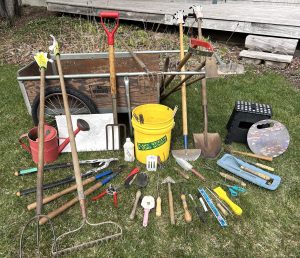 several webinars and in-person workshops to help participants develop their gardening skills. More than 170 Hancock County residents participated in these programs. Some topics included:
several webinars and in-person workshops to help participants develop their gardening skills. More than 170 Hancock County residents participated in these programs. Some topics included:
- Favorite Garden Tools Workshop – Master Gardener Volunteers Continuing Ed
- Tool Sharpening / co-sponsored with Native Gardens of Blue Hill
- 2-Part Beginner Pruning Workshops
- Browntail Moths update
- Gardening Webinars: Gardening with Natives
- Gardening Webinars: Composting and Soil Health, and more!
Hancock County Residents Participate in State-offered Training Programs
The Maine Horticulture Apprentice Training is geared toward those interested in exploring a career in horticulture as an entry-level employee, a high school student, or those interested in changing their career path. Part 1 – Participants have an introduction to horticulture employment in Maine. (Online) Part 2 – Participants are provided in-depth training in the foundations of horticulture; food and tree fruit production; garden pests and diseases; and Maine landscapes and designs (Online). 4 Hancock County residents completed this training.
Maine Gardener Training is designed for home gardeners who desire a foundation in basic horticulture education and skills for personal use. It is recommended for those who would like to access the educational content of the Master Gardener Volunteer training program but do not plan to volunteer. Micro-credentials are not given for this program. 23 Hancock County residents completed this training.
Technical Assistance and Soil Tests for Hancock County Residents

Extension staff fielded 275 inquiries from Hancock County residents regarding pest management, soil test interpretation, home food production, ornamental gardening, composting, and pesticide safety. UMaine Extension’s Pest Management lab continues to diagnose plant diseases, insects, ticks, and veterinary issues. Nearly 1,500 additional contacts were for Tick Identification in Hancock County.
In addition, 544 soil tests were performed for Hancock County growers.
Assistance to Blueberry Growers
UMaine Extension’s Wild Maine Blueberry program offered support to 28 growers in Hancock County. Wild Blueberry Field Trainings/Meetings were offered including Sprayer Calibration and Wild Blueberry IPM sessions.
The Maine Wild Blueberry Conference was held in Ellsworth in February 2024. This annual conference gave attendees the opportunity to come together as a blueberry industry, learn from subject matter experts, and attend a trade show.Co-sponsor of this year’s conference: Wild Blueberry Commission of Maine This event was a collaboration between the University of Maine Cooperative Extension and the Wild Blueberry Commission.
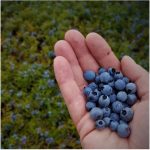
UMaine Extension’s Wild Blueberry Program offers a wide variety of educational materials for growers in Maine including:
FMI: https://extension.umaine.edu/blueberries/
STATE WIDE HIGHLIGHTS
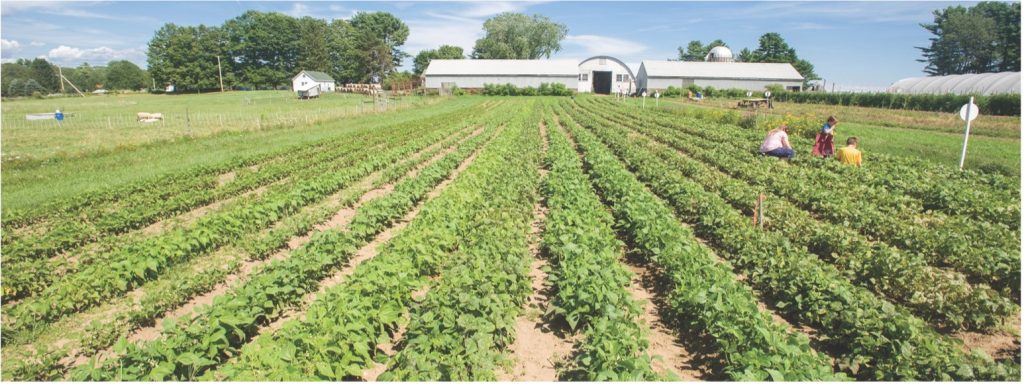
Maine Food System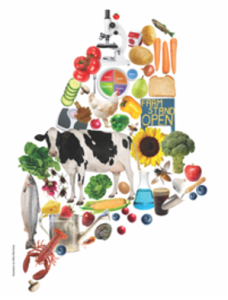
- Integrated Pest Management Saves Millions for Maine Potato Industry
- Wild Blueberry Weed and Blight Management
- Supporting Maple Producers and Encouraging Workforce Development
- Maine Compost Schools Train Respondents for Animal Disease Outbreaks and Disaster Mortalities
- Building Agriculture Literacy Through an Immersive Culinary Experience
- Expanded Food and Nutrition Education Program Increases Food Security and Healthy Behaviors
- Master Gardener Volunteers
- Maine Harvest for Hunger
- Eat Well Volunteers Impact Food Security
- Master Food Preservers Help Support Local Food System
- Veterinary Diagnostic Lab
Integrated Pest Management Saves Millions for Maine Potato Industry
Relevance
The potato industry is the largest agricultural sector in Maine, encompassing more than 530 businesses generating more than $540 million in sales, 6,100 jobs, over $230 million in personal income, and over $32 million in state and local taxes. The Maine potato crop, which averaged 16.8 billion pounds from 2019 to 2023, has its challenges from insects and pathogens alike. Costs to manage these pests can eat up profitability of the crop, and insecticide applications used to manage these pests can pose threats to the applicators, nontarget species, and the environment.
Response
The University of Maine Cooperative Extension Diagnostic Research Laboratory provides pest identification and integrated pest management (IPM) education to commercial and home clients. IPM is a comprehensive approach to solving pest problems with the goal of providing safe, effective, economical, environmentally sound, and socially sensitive outcomes.
Extension’s Potato IPM program worked with 270 farms to monitor pest populations in potato fields in northern and central Maine. Using insect traps and field scouting, farms were visited weekly during the growing season to determine pest population status, and growers were given field reports and up-to-date management recommendations. Data collected from the potato farms were shared with potato growers throughout the state, the northeastern states, and eastern Canada through a weekly newsletter with 463 subscribers.
Growers using the information available through the IPM program have been able to successfully manage potato pests using minimal pesticide applications because sprays were used only when population data indicated a specific need for control. Yields were improved or pesticide sprays reduced, and due to less pest damage, profitability was maintained or improved.
Results
In 2023, Extension’s IPM research and identification efforts saved Maine’s potato industry more than $5 million in losses avoided, yields increased, and pesticide uses reduced.
Wild Blueberry Weed and Blight Management
Relevance
Approximately 485 wild blueberry growers in Maine manage 41,000 acres of this culturally and economically important crop. Proper management of weeds and blight is essential to the success of this industry. Broadleaf and grass weeds compete with wild blueberries for light, water, and nutrients, and can reduce wild blueberry yield up to 80%. In Maine’s wild blueberry fields, “fine leaf sheep fescue” is resistant to many traditional herbicides and cultural weed management tools. Other challenges to blueberry fields are mummy berry and Botrytis blight diseases that can kill leaves and flowers. Each year weather conditions can affect the susceptibility of wild blueberry plants to blight. Blueberry growers need to know when there is a high risk of disease to properly time their use of fungicides to be the most effective and to minimize their number of applications.
Response
Since 1945 when Blueberry Hill Farm was established, UMaine Extension has been conducting research and working with Maine farmers to understand the severity and distribution of fine leaf sheep fescue and how to reduce its spread. In 2023, we continued direct outreach with blueberry farmers individually and through agricultural trade shows and in-season field days. We designed and implemented a pruning and herbicide control demonstration at Blueberry Hill Farm to showcase different combinations of chemical and cultural ways to reduce the spread of this weed. To address mummy berry and Botrytis blight diseases, we use wild blueberry weather stations in wild blueberry fields around the state to monitor weather conditions and fungal development. Extension staff gather information from the blueberry growers and the weather station to provide wild blueberry disease reports on the risk of disease occurring in blueberry growing areas.
Results
Most growers can now identify fine-leaf sheep fescue and have two herbicides and two cultural control options available to them. By suppressing this weed in wild blueberry fields, growers realize substantial savings on herbicides and increase wild blueberry yield and quality. More than 70% of blueberry growers who use fungicides to control mummy berry and Botrytis blight use Extension disease reports to determine the timing of fungicide applications. Mummy berry disease levels have dropped in most fields in Maine where growers use the blueberry disease reports. In recent years, levels of mummy berry disease have been 5% to 25% of stems infected, when in the past the levels were always 25% and higher.
Supporting Maple Producers and Encouraging Workforce Development
Relevance
Maine is the third largest producer of maple syrup nationwide, behind Vermont and New York. Our state produced 470,000 gallons of maple syrup in 2023. Annually, maple syrup contributes an estimated $49 million in production value, more than 800 full- and part-time jobs, and more than $25 million in labor income to Maine’s economy. Maple sugaring has a remarkable connection to the culture, history, and economy of Maine. To thrive, the industry needs research and educational support for 1) existing maple producers, 2) the general public, 3) sugarbush management and climate resilience, and 4) developing a trained workforce for the future.
Response
Extension’s maple education programs provide producers with resources about international grade standards, maple grading techniques, quality control, and food safety in the production process. For 18 years, Extension’s International Maple Grading School (IMGS) has been training maple producers, packers, and inspectors on best practices when grading syrup. In 2023, we offered programming on sugarbush management and climate resilience, including site visits, timely alerts and resources on weather events, and a full-day sugarbush management conference and workshops. We provided public outreach and education through Maple Sugarmaking 101 courses and facilitated a new 4-H club through which youth learned about tree ages, identification, versatility of commercial and ecosystem benefits, the diversity of forest-related careers, and tapping maple trees.
Results
The continued success of the school and its participants helps promote the exceptional image of both the maple industry and its producers who create high-quality products. In 2023, the IMGS provided a platform for industry discussion and education about maple products, grading, and quality issues concerning pure maple syrup. Through Extension’s maple programming, 288 individuals learned about the maple industry, syrup grades, and diverse uses of syrup; more than 60 beginning or backyard sugarmakers participated in two Maple Sugarmaking 101 courses led by our team; and 93 producers participated in our new hybrid model for the IMGS. In addition, 62 producers participated in full-day maple grading programs, helping meet our goal of increasing the amount of marketed syrup that is food-safe, the proper density, free of flavor defects, and graded accurately to ensure consumers purchase syrup with flavor profiles that they expect. Through our 4-H club maple programming, Maine youth were exposed to the diversity of forest-related careers.
Maine Compost Schools Train Respondents for Animal Disease Outbreaks and Disaster Mortalities
Relevance
Composting is a management tool that can be utilized in a variety of sectors to reduce the amount of waste through decomposition and stabilization. Composting can be carried out to reduce food waste, manage animal mortalities, stop the spread of disease, and create a valuable and safe product that can be used in the agricultural, horticultural, and environmental engineering sectors. There is a national need for compost education as we move toward a more environmentally sustainable society.
Response
The University of Maine has identified the need to train members of the workforce on the composting process, uses, and applications, and has met that need by offering weeklong training multiple times a year focused on comprehensive composting training and composting to manage animal mortalities through general agricultural production or in the incidence of disease outbreaks or disaster mortalities. Participants in these trainings are tested on their composting knowledge and receive recognized certification.
Results
In 2023, 40 participants completed the Compost School and 30 participants completed the Carcass Management School. Participants in the Compost School have used the training as professional development and to bring a more robust and rounded set of composting skills back to various businesses to improve understanding, efficiency, and profitability. The majority of participants in our classes this year rated the course as excellent. Participants who have completed the Carcass Management School have passed the initial requirements to become a Composting Subject Matter Expert and will deploy in animal mortality outbreaks due to diseases such as highly pathogenic avian influenza during disaster events.
Building Agriculture Literacy Through an Immersive Culinary Experience
Relevance
Maine’s local food system is a collaborative network that integrates sustainable food production, processing, distribution, consumption, and waste management to enhance the state’s environmental, economic, and social health. Consumers and the culinary arts (CA) workforce play vital roles in supporting a local food system through their daily food choices. Educational efforts targeted toward current and future consumers and the CA workforce will increase their agricultural literacy and positively impact the Maine Food System.
Response
UMaine Extension and Maine Ag in the Classroom collaborated to create the Building Agriculture Literacy through an Immersive Culinary Experience project to help career and technical education (CTE) CA instructors increase their agricultural literacy and enhance the connectedness between agriculture and food service. Funded and initiated in 2021, this four-year project is seeking to create a skilled and educated workforce that will increase the usage of Maine-grown, -processed, and -produced foods in their programs and careers. Project activities have included a weeklong Immersive Culinary Arts Summer Institute for CTE CA instructors, hands-on experience in local food procurement practices, demonstrations of food system lessons, educational field trips, financial support for experiential activities through their existing school restaurants, participation in a University of Maine Local Foods Competition, and coaching during the school year.
Results
In 2023, Maine Food System lessons and experiential food-based activities were delivered to 70% of Maine’s CTE CA programs (650 students and 26 CA Instructors), and 86% (21) of Maine’s CTE CA programs participated in the experiential learning events of the program. The purchasing power of consumers and the CA workforce matters. Maine is home to 1.3 million consumers who have an average annual expenditure on food of $4,576, representing a total value of over $5.9 billion. A consumer shift of 10% of their purchases to Maine-grown and -produced foods creates an influx of more than $594 million toward supporting Maine’s food-based economy. Maine’s restaurants generated $3.3 billion in 2021 and encompassed 50,100 jobs in Maine—8% of the state’s employment. Shifting the local food value system of the future CA workforce will positively impact the use of Maine-grown foods within this multi-billion-dollar industry.
Expanded Food and Nutrition Education Program Increases Food Security and Healthy Behaviors
Relevance
In 2022, 10.9% of Maine people lived in poverty and 10.1% of Maine households experienced food insecurity. In 2022, 33% of Maine adults were obese—an increase from 31% in 2020. The combination of high rates of food insecurity and the complexity of the causes of obesity increases the risk of developing chronic diseases and reduces the quality of life for Maine people. Recent estimates of the cost of adult obesity on healthcare expenditures amounted to an increase of $1,861 in excess annual medical cost per adult, resulting in an annual rise in healthcare costs in Maine by more than $172 billion. Severe obesity was associated with excess costs of $3,097 per adult.
Response
To improve the food and nutrition security of Maine’s parents, caregivers, and young adults who are experiencing limited income, UMaine Extension delivers education through the Expanded Food and Nutrition Education Program (EFNEP) to improve behaviors related to diet quality, physical activity, and using food resources management practices to learn how to plan and shop for healthy meals and snacks. Program outcomes are measured for all adults using validated pre/post-program questionnaires and 24-hour food recalls.
Results
In 2023, 258 adults participated in Maine EFNEP, and the education program reached a total of 1,269 individuals in program families. Fifty percent of adult participants completed pre- and post-surveys showing these results:
- 92% showed improvement in dietary intake.
- 90% showed improvement in food resource management practices.
- 69% showed improvement in physical activity behaviors.
- 73% showed improvement in food safety practices.
Specifically:
- 40% report eating fruit more often each day.
- 36% report eating vegetables more often each day.
- 31% report drinking soda less often.
- 43% report planning meals before shopping more often.
- 40% report making a list before shopping more often.
- 44% exercise for at least 30 minutes most days of the week.
Master Gardener Volunteers
Relevance
Public and private gardens are important tools for enhancing physical and mental health, and they play a key role in sustaining the health and vitality of our natural communities. Since the beginning of the pandemic, gardening has been on the rise in Maine, with our offices experiencing a tremendous influx of gardening questions. As it becomes more and more challenging to sort through information online, Maine gardeners need access to reliable research-based information, now more than ever. Extension trains and supports Master Gardener Volunteers (MGV), who help extend university knowledge to local communities through the teaching of sustainable gardening practices.
Response
The MGV program provides participants with a minimum of 64 hours of in-depth training in the art and science of horticulture. Trainees receive current, research-based information from our educators and industry experts and are connected with service projects that match their interests, skill sets, and availability. MGV coordinators facilitate relationships between MGVs and community partners, assisting with needs assessment, program planning, risk management, and problem solving. In 2023, MGV played a vital role in connecting communities with educational resources through community events, social media, and programming.
Results
The MGV program provides opportunities for gardeners with all levels of experience to connect with meaningful service projects in their community. In 2023, 733 volunteers donated 30,932 hours to a variety of educational and food security projects throughout the state, including school gardens, demonstration gardens, horticulture therapy gardens, pollinator and native gardens, and Maine Harvest for Hunger projects. Their efforts amounted to the direct reach of 932 youth and 3,106 adults through programming and the indirect reach of 3,500 Maine residents through outreach, news articles, TV features, and more. Many volunteers enter the MGV program intending to improve their gardening skills for their personal benefit and leave surprised by how deeply involved and passionate they become about community projects. As they become more involved with the program, they help establish meaningful connections in the communities where they live, and serve as educational resources for their neighbors, schools, towns, and community organizations. These relationships help grow our educational outreach efforts and facilitate positive change in communities across the State of Maine.
Maine Harvest for Hunger
Relevance
Maine continues to face significant challenges regarding food insecurity, with the highest rate in New England and ranked 20th nationwide. According to the latest data from the United States Department of Agriculture (USDA), 10.1% of Maine households are food insecure. Nationally, 17.3% of households with children under the age of 18 and 11.4% of households where an older adult was living alone experienced food insecurity in 2022. Given the pervasive nature of this problem, it remains imperative to implement comprehensive measures to ensure that all communities can adequately support their neighbors in times of need.
Response
Since 2000, UMaine Extension’s Maine Harvest for Hunger (MHH) program has mobilized gardeners, farmers, businesses, schools, and civic groups to grow, glean, and donate fresh produce to food security agencies. Our work involves training volunteers, developing partnerships with farms and organizations, organizing and leading volunteer opportunities, maintaining databases of sites accepting produce donations, and building awareness of the extent, causes, and impacts of food insecurity.
Results
In 2023, 262 MHH volunteers grew, gleaned, and distributed 203,991 pounds of produce, valued at $391,663, to 173 food security agencies throughout the state. We partnered with 112 farms and community gardens on these efforts. One shining example of the many creative ways we connect people with food is the Waldo County Give & Take program. These sites enable gardeners, homesteaders, and farmers to drop off excess produce, and people can obtain free produce anonymously and accessibly. This program began in 2020 with 10 sites; this year there were 19 sites. This project is part of Waldo County Bounty with coordination from Cooperative Extension. About 1,600 donations were recorded this year, which represents some but not all of the donated produce, seedlings, and seeds, and is equivalent to approximately 10,500 pounds of local, nutritious produce. From backyards to farms to school gardens, MHH is enhancing access to healthy food and offering volunteers a truly meaningful way to engage with their community.
Eat Well Volunteers Impact Food Security
Relevance
Food insecurity challenges 10.5% of Maine’s population (Map the Meal Gap, 2023). Although Hancock and Washington Counties house more than 19 food pantries dedicated to alleviating hunger, there exists a critical gap in educating pantry visitors about making healthy food choices and embracing nutrition education. Conventional food security initiatives primarily focus on distributing food, and many pantry patrons are constrained by availability and often find unfamiliar produce intimidating.
Response
The Eat Well Volunteer Program responds to this education gap by empowering families with tools to confidently prepare nutritious meals at home. Our trained volunteers guide pantry visitors through recipes, introduce them to unfamiliar produce, and foster a welcoming environment where they can openly learn about food safety and nutrition. This Extension program trains volunteers in essential skills, including sensitivity and inclusion training, food safety, knife skills and food preparation tips, nutrition standards, lesson plan reading, and cooking demonstrations. Through partnerships with pantries, the Eat Well Volunteer Program conducts regular, volunteer-led programming aligned with the growing season. Participants receive recipe packets related to featured monthly produce, tip sheets on food safety, fresh produce, and engaging and informative demonstrations at the pantries.
Results
Through this Extension and food pantry collaboration, more than 400 limited-income patrons have directly benefited from nutrition education, food safety training, and recipe preparation advice. Collaborating with UMaine Extension Master Gardener Volunteers, the program also contributes more than 500 pounds of fresh produce to food pantries annually, further enriching its nutritional programming. The impact extends beyond tangible benefits, as volunteers themselves report positive experiences and personal growth. Through the program, volunteers forge meaningful connections within their communities, experience the fulfillment of giving back, and enhance their knowledge about food education. Through education, collaboration, and hands-on involvement, the program is transforming lives and fostering a healthier, more resilient community.
Master Food Preservers Help Support Local Food System
Relevance
Over the past decade, interest and demand for local food and food preservation have continued to grow, due in part to economics and the public’s interest in supporting a local food system. UMaine Extension efforts seek to create a social shift toward a more educated and skilled public that will revitalize our local food system and positively impact the local agricultural economy through an increase in safely preserving local Maine foods at home to eat year-round.
Response
In 2023, 49 Master Food Preserver volunteers completed more than 350 hours of food preservation education, community projects, and administrative tasks. Volunteers taught preserving workshops through Adult Education, Cooperative Extension offices, and community centers. Volunteers staffed educational displays and demonstrated at farmers’ markets, harvest festivals, agricultural fairs, and local food events. In all, their community impact in volunteer time was valued at more than $11,000.
Results
These volunteer efforts reached more than 880 people in nine Maine counties. When surveyed, program participants report:
- 88% plan to do something differently when preserving.
- 100% understand how to preserve foods better.
- 96% feel more confident about their food preservation skills.
- plans to can jam and jelly, pickles, and tomato sauces, while freezing vegetables, fruits, and tomato sauces.
Veterinary Diagnostic Lab
Relevance
The vitality of Maine agricultural and aquacultural producers depends on many factors, including their success in identifying animal health-related problems.
Response
UMaine Extension’s Veterinary Diagnostic Laboratory (VDL) performs rigorous diagnostic testing of biological samples from domestic and wild animals. Services provided by the VDL support Maine livestock producers, companion animal owners, and animal health regulatory agencies. This includes disease surveillance with the state’s Department of Inland Fisheries and Wildlife; the Department of Agriculture, Conservation, and Forestry (DACF); USDA Animal and Plant Health Inspection Service; and forensic pathology for animal abuse and neglect cases through DACF’s Animal Welfare Program. We conduct and collaborate on applied and basic research within Cooperative Extension, UMaine, and with state and federal agencies.
In 2023, the VDL responded to more than 100 client inquiries, reported on more than 250 case submissions, and received and processed more than 900 physical samples, including mastitis submissions (52% of samples), environmental surveillance samples for Salmonella enteritidis regulatory testing (29% of samples), necropsy + ancillary postmortem testing (20% of samples), and parasitology samples (9% of samples). Our veterinary anatomic pathologist conducted more than 80 necropsies on 17 different species, most commonly avian (46%) and small ruminants (14% goat, 8% sheep), with fewer dogs (10%), cats (3%), cattle (4%), and horses (3%) during this time. Twelve percent of necropsy cases are the result of collaborations with the Maine Department of Inland Fisheries & Wildlife; these included red fox, raccoons, corvids (crows, ravens), raptors (red-tailed hawk), and cervids (deer, caribou).
Results
We were able to identify eight necropsy cases over the last eight months as reportable animal or zoonotic diseases, including rabies virus, eastern equine encephalitis virus, West Nile virus, Avibacterium paragallinarum (infectious coryza), avipoxvirus (fowl pox), and Mycobacterium avium ssp. paratuberculosis (Johne’s disease). This information will assist in guiding future applied research and educational outreach efforts. Our lab hires a small number of student workers of diverse backgrounds, who benefit the lab by providing energetic, curious, and detail-oriented efforts. These students help us adapt our methods to develop better teaching and outreach materials for farmers, at the same time as they receive mentoring and develop skills and knowledge that will help them in their veterinary careers. The VDL combines service, research, and education to improve agriculture, the food system, and the quality of life in Maine.
4-H Positive Youth Development
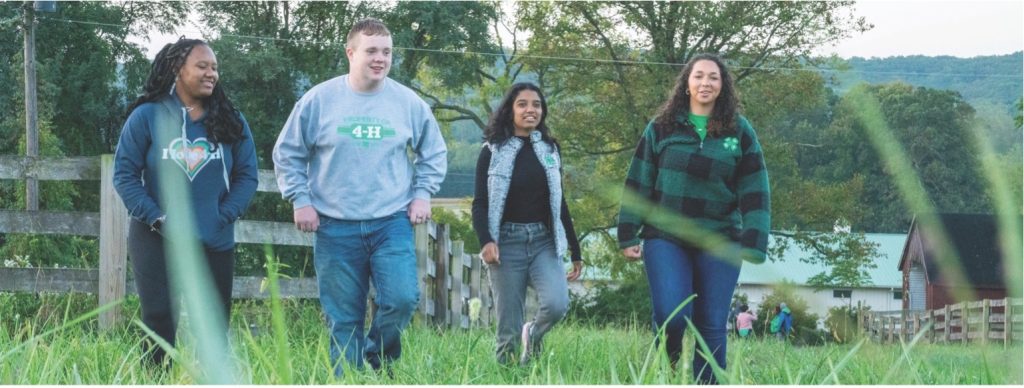
- Summer of Science STEM Enrichment for Children Experiencing Poverty and Immigrant and refugee families
- Maine 4-H Community Central

- Advancing STEM Learning Through Connected Learning Ecosystems
- Engaging Maine Youth in Maine’s Thriving Aquaculture Industry
- 4-H Ambassadors Mentoring Students Toward STEM Careers
- 4-H Camp and Learning Centers Connecting Youth to the Outdoors and Building Community
- Parent Education Promotes Early Screening and Intervention for Developmental Delays
- Increasing Healthy Behaviors in Youth Through Expanded Food and Nutrition Education Program
Summer of Science STEM Enrichment for Children Experiencing Poverty and Immigrant and Refugee Families
Relevance
Children experiencing poverty have less access to enrichment activities, contributing to an achievement gap between them and their more affluent classmates. This gap accelerates during summer months, when children from low-resource backgrounds tend to fall behind in grade equivalency compared to their peers. This condition can be especially acute for children living in public housing neighborhoods, including many of Maine’s immigrant and refugee families in the metro areas of Portland and Lewiston. Access to STEM enrichment activities leads to improved academic success, more educational attainment, and better employment opportunities.
Response
UMaine Extension created the 4-H Summer of Science (SOS) in 2012 to: 1) improve youth aspirations in STEM, 2) introduce STEM careers to youth, and 3) mitigate summer learning loss and the achievement gap. Over time, the SOS program has developed to include teens as teachers and college interns as teacher mentors. The SOS program focuses on programming where youth already are (in neighborhoods, libraries, and community sites) and uses positive 4-H youth development practices to reduce barriers to STEM activities. By engaging in Summer of Science activities, the 4-H youth are well poised to return to their academic school year with reduced summer learning loss and an increased interest in science. In 2023, UMaine 4-H faculty and staff designed four STEM lessons that were taught in seven southern Maine communities at 19 sites, including Boys & Girls Clubs, the YMCA, summer lunch programs, public housing centers, and libraries. There were 269 adult volunteers and summer staff who taught 822 youth in the field of environmental DNA (eDNA). Fifty-seven percent of youth participants were nonwhite (404 of them of black or African American origin).
Results
Research by UMaine faculty shows that well-designed STEM lessons delivered by near peers (teens and college students) support STEM career aspirations and lead to better content knowledge. Research also shows that youth involved in 4-H are more likely to pursue future courses or a career in science, engineering, or computer technology, which can lead to improved employment opportunities. For Maine elementary school youth, SOS supports narrowing their STEM achievement gap during summer months, and for the teens trained to deliver programming, it fosters their career development, leadership abilities, and sense of responsibility. Teen teachers in the SOS program report improved socio-emotional skills and applicable workforce skills, as well as increased resiliency.
Maine 4-H Community Central
Relevance
Youth need skills and experiences to help them be successful adults in a complex and ever-changing world. As they move toward adulthood Maine youth need to understand their career and education possibilities and to build skills necessary for their personal and professional development as the future of the Maine workforce.
Response
Community Central offers 4-H Positive Youth Development for high school students in Lewiston and Portland with a focus on workforce skill development and career/college exploration while increasing social capital. Most participants are black, Indigenous, and other people of color (BIPOC) teens, and many are from immigrant/refugee families. In 2023, two 4-H professionals provided programming for youth in Lewiston and Portland, offered in partnership with the public schools and housing authorities. Short-term SPIN clubs offered connections with local professionals, and long-term weekly programming offered hands-on skill development. All sessions were designed based on youth interest in real-time.
Results
In 2023, 4-H Community Central engaged 141 youth, of whom 87% were nonwhite, with 44 identifying as black or African American. As a result of participation, participants were able to build their social capital and connect with professionals in their communities who are part of the areas of the workforce they are interested in pursuing. Participants were able to access 4-H in a variety of methods, thus broadening their life skill, leadership, and personal development: weekly school year skill development programming, SPIN clubs based on specific sectors of the workforce, National 4-H conferences (Ignite Summit and True Leaders in Equity), Maine teen conferences (Maine Youth Council Teen Conference and MYAN Youth Leadership Conference), and through community service-learning projects with several community partners. Two participants also joined the Maine 4-H Youth Council and four enrolled in the CMMC Junior Volunteer Program after meeting the volunteer coordinator during a Medical/STEM SPIN session. Community Central, in partnership with numerous community partner organizations, allows teens to explore various career and education possibilities and builds skills necessary for their personal and professional development as the future of the Maine workforce.
Advancing STEM Learning Through Connected Learning Ecosystems
Relevance
Research indicates that youth are influenced by various factors, including family, school, work, and extracurricular activities, all of which significantly contribute to shaping their confidence, interest, and agency in science. Recognizing the importance of these diverse learning contexts is essential for fostering authentic STEM learning. There has been a shift to approaching STEM education from an “ecosystem” perspective, creating multiple entry points and pathways both within and outside of traditional educational settings to provide youth with engaging locally relevant experiences. To facilitate meaningful connections within a local “ecosystem,” educators and practitioners in diverse spaces need a platform to engage with one another, share initiatives, articulate goals, and discuss the experiences of the youth they serve.
Response
Learning Ecosystems Northeast (LENE), a NASA-funded network of Connected Learning Ecosystems (CLEs), led by the Gulf of Maine Research Institute, recruits and supports regional peer communities of teachers, librarians, and informal educators with a shared goal to create multiple pathways for youth to find their interest and passion for STEM learning. Focused on climate science and data literacy, these CLE communities are designed to permeate the boundary between in and out of school, ensuring youth experience connected learning in diverse environments and experience various layers of positive influence on their science identity. Maine 4-H staff are integral to this initiative and actively participate in local CLEs, collaboratively supporting place-based investigations of climate change that bridge formal and informal learning spaces. The overarching vision is to build a climate-literate generation with the skills necessary to thrive in a changing world.
Results
The impact of Maine LENE’s CLEs has been transformative in connecting the educators who deliver STEM learning experiences to youth in their communities. Collaboration between 4-H staff and other educators in their communities has expanded, fostering a vibrant exchange of educational resources and experiences. In 2023, 114 youth educators participated in these CLEs, which have resulted in new climate- and data-focused Maine 4-H programs, including the 4-H Tick Project, Vernal Pools Club, Virtual Algae Club, Pollinator workshops, Eclipse Investigations, and more, collectively reaching 2,095 Maine youth. The development of these programs and engagement in CLE activities has led to increased 4-H staff confidence and skills in facilitating climate and data science learning experiences. This initiative is not merely cultivating knowledge; it’s sowing the seeds of a climate-literate generation and forging enduring connections between educators and the youth they inspire.
Engaging Maine Youth in Maine’s Thriving Aquaculture Industry
Relevance
Maine communities have a long tradition of harvesting healthy seafood and taking care of the environment. As part of the Blue Economy, which seeks to use ocean environments in a sustainable way to support jobs and economic growth, aquaculture is one of the fastest-growing sectors in Maine and includes more than 200 farms and 700 farmers producing premium seafood (finfish, shellfish, and sea vegetables) and realizing $110M in annual sales. In-state total employment is expected to increase by 33% by 2030. Although aquaculture and its technologies are a growing part of the Blue Economy, widespread support for aquaculture products is lacking. Creating opportunities for youth to engage in aquaculture programs can have positive implications for consumer education and awareness, and lower barriers that rural youth experience, such as low wages, job security, aspirations, and the need for higher education in STEM fields.
Response
Maine 4-H, in partnership with the UMaine Center for Cooperative Aquaculture Research and the Aquaculture Research Institute, has continued to expand the 4-H Aquaponics Project, an innovative workforce development program designed to harness youth interests in fish and gardening to cultivate real-world skills applicable to the fast-growing aquaculture industry. It is a nationally recognized, youth-centered, innovative program that honors 4-H roots in agriculture and animal and plant science, and a viable model to extend Extension’s programs and cultivate youth interests in aquaculture careers and technologies. The curriculum is aligned with Maine’s Aquaculture Occupational Standards, which specify the current workforce skills and training needs of Maine’s aquaculture sector. the project is supported by a team that Includes formal and informal educators, youth leaders, industry partners, scientists, and collaborating partners.
Results
In 2023, the project has reached nearly 400 youth participants, who are participating from their classrooms, homeschool, or out-of-school programs (such as summer camps). The 4-H Aquaponics Project outcomes include gains among youth in their knowledge of aquaculture principles, practices, and technologies, as well as aquaculture career readiness. Through 4-H Aquaponics, youth participants gain a deep understanding of novel, complex systems, while practicing important life skills such as resiliency and troubleshooting. They also develop skills that are sought after by the aquaculture industry (for example, basic knowledge of fish biology, understanding water quality issues, project management, teamwork, and more). The project has increased access to aquaculture education opportunities for Maine youth and generated an increase in 1) awareness and understanding of the aquaculture industry and related technologies; 2) knowledge about aquaculture careers; 3) aquaculture career aspirations; 4) knowledge about innovative aquaculture systems; and 5) capacity for high-quality aquaculture education.
The 4-H Aquaponics Project is being lauded as a viable workforce development program for the aquaculture sector in Maine and nationally. The project is investing in the future of Maine youth and a vital and growing aquaculture industry in the state. The project is giving youth participants exposure to and training in the industry, and it is developing a potential labor pool to meet the projected workforce demands in the years ahead.
4-H Ambassadors Mentoring Students Toward STEM Careers
Relevance
Developing Maine youth STEM literacy is vital to ensuring that our state continues to thrive economically and socially. Given the remote and diverse communities where Maine youth live, informal education can help minimize inequities in rural youth STEM education and career pipelines. Future career opportunities in Maine will depend heavily on STEM skills, whether in the growing fields of healthcare and engineering, or in positions requiring technical skills, such as construction, and maintenance of transportation and energy systems.
Response
4-H STEM Ambassadors are trained University of Maine System students enrolled as 4-H volunteers who facilitate hands-on STEM activities with youth 8–14 years old throughout Maine. Since 2014, our 4-H STEM Ambassadors program has enrolled and trained nearly 600 University of Maine System students who have facilitated in-person, hands-on learning experiences fostering youth STEM enjoyment, literacy, and identity, reaching more than 6,000 Maine youth in classrooms, libraries, and after-school clubs across the state. In fall 2020, Extension redesigned the program to be virtual, including a training, mentoring, and experiential STEM programming. The shift to a virtual program allowed for multicampus student teams and increased access for more distant community partners regardless of local program model (remote, in-person, hybrid).
Results
In 2023, the program reached more than 200 students, grades 3–8, with the help of 63 volunteer Ambassadors and staff. Through this program, youth ages 8–14 come to view these Ambassadors as mentors and leaders in their community while also developing skills in STEM through hands-on activities and becoming connected to research, resources, and scientists at Maine’s public universities.
4-H Camp and Learning Centers Connecting Youth to the Outdoors and Building Community
Relevance
Research has shown that positive social and emotional learning experiences can significantly impact youth development and that connecting youth to a positive adult role model decreases the risk for making unhealthy choices or engaging in risky behaviors. Especially since the pandemic, youth are spending more time connected to social media and other digital platforms, resulting in isolation and sedentary indoor time. Many youth suffer from obesity and/or attention-deficit/hyperactivity disorder (ADHD). Many lack opportunities to develop positive interpersonal communication skills.
Response
UMaine Extension 4-H Camp and Learning Centers provide programs for youth ages 4–17, many from underserved populations. Using evidence-based practices and program design principles, these transformational experiences develop a sense of place and belonging, and confidence in the outdoors. Our programs include both day and residential summer camps, on-site Outdoor School programs, in-school enrichment, as well as adult programming and workshops. We have a well-developed virtual component to our programs that gives them added depth and maximizes accessibility. Our Learning Centers typically attract more than 2,500 youth each summer, and provide school programming for more than 6,000 students from 60+ Maine school groups.
Results
In 2023, our 4-H Camp and Learning Centers:
- Delivered year-round programming at the UMaine 4-H Learning Centers at Blueberry Cove, Bryant Pond, and Tanglewood, including programs in water ecology, forest ecology, wilderness survival, and conservation education.
- Continued to support Telstar Freshman Academy at Bryant Pond, offering daily, yearlong, experiential learning designed to engage students in an outdoor setting.
- Continued to deliver the NorthStar Youth 4-H Mentoring program that connects young people with caring adults through community engagement, cultural exchange, and adventure challenge and leadership. The program is grounded in in-person contact, and also uses virtual contact for family and other activities.
- At Greenland Point in Washington County, one of Maine’s most impoverished counties, we offered hands-on, ecology-focused education. We provided significant scholarship funding, ensuring cost is not an obstacle to anyone who wants to come to camp.
- At summer camps and open-air classroom programs, Tanglewood and Blueberry Cove offered programs tailored to community needs, including youth development programs for schools.
Our 4-H Camp and Learning Centers provided life-changing outdoor learning programs for youth ages 4-17, many from underserved populations. In addition, we worked with dozens of classroom teachers and engaged more than 50 volunteers in supporting our work. In three out of four counties in which we operate, Cooperative Extension and 4-H are the only connections to a four-year institution of higher education. Through innovative, evidence-based youth development programs that utilize outdoor and community-connected learning, we provide pathways for youth to achieve post-secondary success in college or meaningful careers.
Parent Education Program Promotes Early Screening and Intervention for Developmental Delays
Relevance
The first three years of a child’s life are a critical time for growth and development. Maine Families Home Visiting program provides services at a minimum of one time per month. Parent Educators support early identification of developmental delays by offering developmental screenings to families during home visits and providing additional activities in areas where a child may need extra support for growth. If needed subsequent referrals are offered as appropriate early intervention services are essential to reduce the long-term impacts and school readiness.
Response
UMaine Extension’s Parent Educators are part of a statewide network of Maine Families Home Visiting Programs that provides services at a minimum of one time per month. Using the parents as teachers model, certified Parent Educators meet with families in their homes and 1) provide them with current information on child development and parenting, 2) share activity ideas and ways to engage and nurture their child’s optimal development, and 3) provide connections and linkages to community resources. During each home visit Parent Educators offer book sharing opportunities and information about early literacy, including the importance of reading aloud. Parent Educators provide free children’s books to all enrolled families, including books in French, Lingala, and Spanish for families who are non-English-speaking.
At each visit, developmental information, anticipatory guidance, and an activity to promote growth are provided. Certified Parent Educators encourage parents to continue learning beyond the visit. Parent Educators support the early identification of developmental delays by offering developmental screenings to families during home visits and providing additional activities in areas where a child may need extra support for growth. If needed, subsequent referrals are offered, as appropriate early intervention services are essential to reduce the long-term impacts and improve school readiness.
Results
In 2023, 10 certified Parent Educators provided 2,143 home visits to 215 children living in five counties, with 98% receiving timely and complete developmental screenings.
Increasing Healthy Behaviors in Youth Through the Expanded Food and Nutrition Education Program
Relevance
Obesity is a chronic disease. Nationally 17% of youth ages 10–17 are experiencing obesity. In Maine, 13.8% of youth ages 10–17 and 14.9% of high school students have obesity. Recent estimates of the cost of childhood obesity on healthcare expenditures found that obesity was associated with an increase of $116 per child in annual healthcare expenditures, resulting nationally in $1.32 billion of medical spending. Severe obesity was associated with annual excess healthcare costs of $310 per child. Nutrition insecurity, or lack of consistent and equitable access to healthy, safe, and affordable foods that promote optimal health and well-being, increases the risk of poor health of Maine’s children in the short- and long-term. In Maine, 1 in 7 children (14.6%) under the age of 18 years are experiencing food insecurity. Of those 36,490 children, 42% of households do not qualify for federal food assistance programs and need to rely on charitable organizations for supplemental food.
Response
To help lower childhood obesity rates, UMaine Extension Expanded Food and Nutrition Education Program (EFNEP) delivers education to Maine’s low-income children to improve their knowledge, behaviors, and attitudes related to improving diet quality, increasing daily physical activity, and using food resource management practices to learn how to plan and shop for healthy meals and snacks. Program outcomes are measured for all youth ages 5–18 using validated pre/post program surveys.
Results
In fiscal year 2023, 1,774 youth participated in Maine EFNEP. Youth participated in an average of six educational lessons over three months. Seventy-seven percent of youth participants completed a pre- and post-survey. As a result of participating in EFNEP:
- 82% improved their abilities to choose foods according to current dietary guidelines or improved nutrition knowledge.
- 44% improved their daily physical activity practices.
- 47% used safe food handling practices more often.
- 56% improved their ability to prepare simple, nutritious, affordable food.
Sustainable Community and Economic Development
- Micro-credentialing Through the University of Maine System Builds Workforce Competence and Confidence
- Extension Homemakers Meet Diverse Community Needs
- Farm and Ranch Stress Assistance Network
- Extension Shares PFAS Resources for Farmers
- Marine Extension Team Supports Community Sustainability/Resilience, Fisheries and Aquaculture, and Ecosystem Health
Micro-credentialing Through University of Maine System Builds Workforce Competence and Confidence
Relevance
Extension provides valuable skills to both youth and adult learners. There is a need to provide employer-recognized evidence of training and skills for agricultural and other workers.
Response
In 2020 we began developing and issuing micro-credentials through the University of Maine System. In 2022, these included micro-credentials and badges in Meat Cutting, Horticulture Apprenticeship, Seafood HACCP (hazard analysis and critical control points), Meat and Poultry HACCP, Food Processing Sanitation, Food Safety Systems, and Facilitation. Youth in the 4-H Communication Science program are now eligible to receive the nationally normed and recognized “Oral Communication” badge from the Education Design Lab. In 2023, we worked on expanding Extension micro-credentials, including developing guidelines for UMaine, networking at the UMaine and University of Maine System level, creating teams, and writing metadata with subject matter experts. Micro-credential participants were in 4-H STEM Ambassadors, food safety, aquaculture and 4-H aquaculture, facilitation, collaboration, food processing, horticulture, meat cutting, resilience, collaboration, and oral communication. We worked on updating badges in volunteer management, climate resilience, aquaculture, and outdoor leadership.
Results
In 2023, 482 badges were issued to UMaine Extension participants. Earners ranged from current University of Maine System students to adults in the general public. These credentials can be used to showcase skills earned through Extension and are verified by UMaine. Micro-credentials help earners make competencies visible, beyond what is seen on a transcript or résumé; demonstrate skills in real-world settings; gain work experience and receive valuable performance feedback; stand out to employers; better articulate the skills developed to potential employers; enhance digital identity; share badges; and be recognized. All micro-credentials/badges can be shared on social media and professional sites, such as LinkedIn and the holder’s personal website, e-portfolio, or résumé.
Extension Homemakers Meet Diverse Community Needs
Relevance
Many communities throughout Maine face poverty, and many families are considered food insecure. Budget cuts and inflation mean that every sector of community living is affected when resources are reduced. Janet was a helper. When Janet passed away from complications resulting from a heart transplant, her family wanted her legacy as a helper to live on. They created Janet’s Jammies, through which volunteers sew pajamas to send to children in need in the State of Maine. There are hundreds of young children throughout our state who live at or below the poverty level, including homeless children, foster children, and refugees. Providing warm pajamas for Maine’s vulnerable children helps them to stay warm and feel loved.
Response
The Maine Extension Homemakers Council has clubs with more than 250 members statewide. In 2023, this volunteer group identified community needs and worked to contribute both financial and volunteer hours to community partners to meet the needs of Maine’s most vulnerable citizens. They heard of Janet’s Jammies and decided to set a goal of making 300 pairs of pajamas in honor of Janet. Several branches of the United Way of Maine agreed to distribute the pajamas.
Results
In 2023, Maine Extension Homemakers raised and donated $26,437 to civic organizations, nonprofits, and individuals throughout Maine. They also provided 4,986 hours of volunteerism within their counties and communities. In all, their community impact was valued at $175,768. The fingerprints of the efforts of the Maine Extension Homemakers can be seen in school libraries, at food pantries, in local town offices, with the Newborns in Need program, at the Home for Little Wanderers, at Hope and Justice Project shelters, in the back seats of state police cars, in hospitals and nursing homes, and in assisted living facilities. Their community efforts have been visible at animal shelters, historical societies, and on the faces of people protecting themselves from COVID-19 and the flu. Homemakers made more than 300 pairs of Janet’s Jammies, each sporting a red heart as a symbol of Janet’s love of helping, and of her heart transplant. Janet’s family provided cotton shirts to accompany each pair of jammies, and each set of pajamas was wrapped and tied with a ribbon and distributed by United Way chapters throughout Maine. Extension is in our communities, thanks to the Maine Extension Homemakers.
Farm and Ranch Stress Assistance Network
Relevance
Mental health is an overlooked challenge farmers face nationwide. Farmland loss and land access issues, rising production costs, plummeting farm incomes, climate change, and most recently, the pandemic are contributing to a mental health crisis within the farming community. The taxing nature of agricultural work makes it one of the most hazardous jobs, with risk of injury, disability, and death higher than most other professions. Daily decision-making in the context of long-term planning to ensure crop and livestock yields and profits can prove extremely difficult. Even the most proactive planning can be short circuited by factors beyond an individual’s control, such as natural disasters. Suicide rates among farmers and ranchers are well above the national average, while mental health services are less available and accessible in rural areas.
Response
In the 2018 Farm Bill, the Farm and Ranch Stress Assistance Network was established to support farmers, ranchers, and other agricultural workers with stress management and offer a pathway for improving mental health awareness and access for farmers and their families. USDA NIFA awarded funds to four regional entities to help launch the network. The Northeast funds ($4.8 million dollars) were granted to the National Young Farmers Coalition, with subcontracts to UMaine Cooperative Extension, Farm Aid, Vermont Farm First, Northeast Farmers of Color Land Trust, and Migrant Clinicians Network, to assist with advising the direction of the project and bring together network members. Extension produced a Farm Wellness brochure and website, and they offered wellness grants for farmers, small grants for organizations, and training for service providers (secondary trauma, de-escalation techniques). Partnerships with 10 collaborators helped to expand reach to Latinx, other non-English-speaking audiences, Black/African American, Indigenous/Native American, other people of color, disabled/veterans, and LGBTQ+.
Results
As a result of these actions and general education about mental health, service providers/Extension professionals are now a stronger source of referral. They offer opportunities to have conversations with farmers and then make referrals for mental health services. Well over 500 farmers benefited from the funding. There is more awareness of Extension and ag service providers as being part of mental health conversations with farmers.
Extension Shares PFAS Resources for Farmers
Relevance
Per- and polyfluoroalkyl substances (PFAS) contamination from historical applications of sewage sludge is an emerging crisis in agriculture worldwide, and Maine is at the forefront of this crisis. Crops may be grown on soil containing these PFAS, but how much of these chemicals is in the crop depends on the type of crop, what part of the crop is edible, soil properties, and PFAS levels in the soil. These chemicals may end up in the milk and meat of animals fed crops such as hay containing PFAS. These chemicals can also move from the soil into the groundwater and into well water. Consuming contaminated milk, meat, plants, or water are potential ways people can be exposed to these chemicals. In 2021, the ME Department of Environmental Protection launched a statewide investigation of the presence of PFAS in soil and groundwater at historically licensed sludge and septage land application sites. As of November 2023, 54 farms have been identified that have at least one soil or water sample that exceeds current screening levels. Farmers and gardeners need reliable and timely information to assess the risks that PFAS contamination may pose to them and their operations, and to access available resources and support.
Response
In response to the PFAS contamination crisis in Maine, UMaine Extension has led and collaborated on several initiatives to provide farmers and gardeners with critical information and support. We created a FAQ for Extension staff and developed fact sheets for farmers and gardeners, hosted on the new “Extension PFAS and the Maine Food System” website extension.umaine.edu/agriculture/guide-to-investigating-pfas-risk-on-your-farm/, and created a Guide to Investigating PFAS Risk on Your Farm as a comprehensive collection of resources about PFAS contamination in Maine. To facilitate statewide communication, Extension initiated and coordinates the Maine PFAS network. This coalition of Maine agencies, organizations, and individuals holds monthly update meetings and hosts a listserv to ensure that agricultural service providers are providing consistent, timely, and comprehensive information and support to impacted farmers and others in the agricultural community. Finally, Extension faculty are leading and collaborating on several research and Extension teams (within Maine as well as with Michigan and New Mexico) that have applied for funding to engage with impacted farmers and to research practical PFAS mitigation strategies for farmers.
Results
Farmers and gardeners in Maine now have access to timely information and direct support related to PFAS contamination. In 2023, Extension’s PFAS-related website content received 10,910 views. Using the dedicated Extension email address, 48 clients requested and received information and assistance. Most commonly, clients ask for guidance on how to assess PFAS contamination risks on their farm or in their garden, and how to access testing.
Marine Extension Team Supports Community Sustainability/Resilience, Fisheries and Aquaculture, and Ecosystem Health
Relevance
Climate change is requiring Maine communities to build the capacity to make informed decisions on the management of coastal and marine resources that promote ecological and economic sustainability.
Response
Maine’s Marine Extension Team (MET), a collaboration of UMaine Extension and Maine Sea Grant, continued to help communities gain the capacity to make informed decisions on ecologically and economically sustainable management of coastal and marine resources. MET members worked with communities to address problems and respond to opportunities in four major areas: ecosystem health; sustainable coastal communities; fisheries and aquaculture; and coastal community resilience.
Results
Our research and outreach collaboration benefits Maine broadly by marrying Extension’s outreach and programming experience with Sea Grant’s marine research and knowledge of coastal communities and issues. In 2023, our projects included:
- Maine Community Resilience Workbook, an inventory of best practices, useful tools, available resources, technical experts, and all current climate adaptation activities across the state. It was compiled to allow municipalities and community groups to engage more effectively in climate change.
- Building Your Virtual Facilitation Skills, a training series in partnership with Extension educators in four states, last year trained 65 professionals and community members in Maine.
- Recirculating Aquaculture Salmon Network (RAS-N) with Maryland Sea Grant, Wisconsin Sea Grant, and academic and industry partners to address barriers in land-based salmon aquaculture, and hosting online and in-person events on topics that industry partners identified as top priorities.
- Through the Maine Aquaculture Hub, investing $471,000 in 14 projects designed to address industry-identified barriers to aquaculture development in the State of Maine, such as reducing costs of biotoxin testing of raw scallops, to providing educational experiences for undergraduates centered around traditional ecological knowledge in aquaculture.
- With the Maine Oyster Trail, continuing to support Maine’s oyster farmers with the first digital and interactive oyster trail in the US; partnering with 85 Maine oyster farms and businesses to drive coordinated tourism to Maine’s working waterfronts; and piloting an advanced Aquaculture in Shared Waters program, which engaged more than 80 seaweed and shellfish farms and businesses in new hands-on curriculum and professional development opportunities.
- Addressing the challenges to sustainable growth of the threatened green sea urchin industry, through a research collaboration with the University of Rhode Island, the Maine Department of Marine Resources, and the Maine Urchin Zone Council.
- Through the Southern Maine Volunteer Beach Profile Monitoring Program developed and coordinated by the MET, successfully collaborated with the Maine Geological Survey to launch a new data management portal. Data provided by the program is being used by the Maine Geological Survey, National Weather Service, Army Corps of Engineers, and participating municipalities to guide beach management.
- Leading efforts in Maine to recapture retired plastic equipment from the aquaculture and fishing industries, including mechanisms to prototype useful items from recovered plastics, and contributing to network-building in the state to build capacity to reduce plastics pollution in the marine and terrestrial environments.
- Hosting the National Aquaculture Extension Conference in virtual format in 2021 and an in-person Portland event in 2022, providing education, networking, technology transfer, and mentoring opportunities for Extension professionals from across the nation. Our programming supports both Cooperative and Sea Grant Extension professionals, allowing Extension professionals to support Maine communities and industry more effectively.




